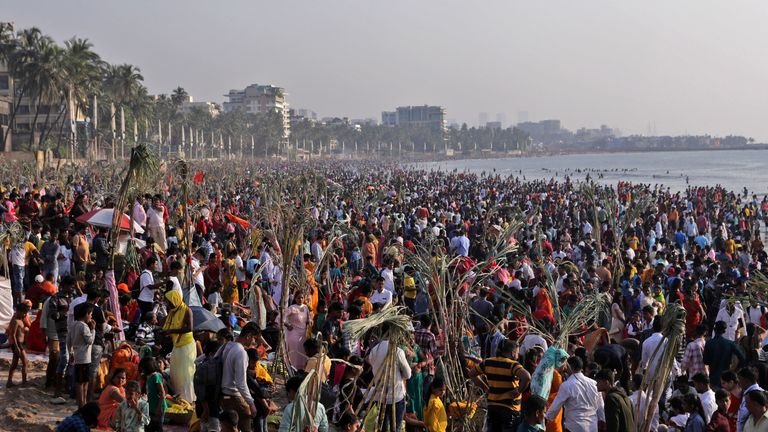According to projections from the United Nations Population Division, the world’s eighth billionth resident will be born today.
Eight billion people will live in the world, three times as many as in 1950. However, despite living longer lives, global population growth is slowing down.
The global population growth rate was below 1% in 2020. This is due in large part to a lower birth rate. Women have fewer children because of widespread contraception, better education, and greater mobility for girls and women.
Globally, the population is getting older. 10% of people are over 65. This number will rise to 16% by 2050.
In 2050, the number of people over 65 will double that of those below five years old.
Where does it grow the fastest?
Two of the fastest growing regions in the world include East and Southeast Asia (home to 2.3 billion people) and central and South Asia (home to 2.1 billion).
China and India, which have 1.4 billion inhabitants each, are currently the most populous countries in the world.
Based on UN projections, India will surpass China in 2023 for the first-time.
Eight countries will account for more than half of the projected global population growth up to 2050: the Democratic Republic of the Congo (DRC), Egypt, Ethiopia and Nigeria.
Sub-Saharan Africa is expected to contribute more that half of the 2050 increase.
The Democratic Republic of Congo (DRC) and Tanzania will see the greatest growth, with both seeing their populations double over the next 30 years.
The largest growth spurts elsewhere in Africa will be seen in Nigeria, Ethiopia, and Egypt.
The Philippines and Pakistan will experience the greatest growth in Asia, other than China and India.
It is likely that 46 of the poorest countries will experience the fastest growth in their populations between now 2050.
Two thirds of this growth will be driven by the existing population and its youthful structure.
Is the population shrinking?
Due to long periods with low fertility, the world’s population is not growing as fast as it has in decades.
More than two-thirds of the world’s population lives in countries with fewer than 2.1 children.
This is about the level that would result in zero growth globally.
Between now and 2050, the population of 61 countries is expected to decrease by at least 1%. This could be due to decreased birth rates or higher levels of migration.
Continue reading:
The poorest are being hit by overpopulation. Family planning is still controversial in Nigeria
COVID decreases life expectancy
The average life expectancy dropped from 72.8 years to the date of the pandemic in 2019, to 71 in 2021.
However, COVID had a different impact on each region.
The Caribbean, Latin America, and Central Asia were hardest hit – with the average life expectancy dropping by three years.
However, in Australia and New Zealand both closed their borders and adopted a zero COVID policy for the majority of the pandemic. Life expectancy rose by 1.2 years because of a lower risk of dying from other causes after each lockdown.
Although some pregnancies were reduced by Coronavirus, there was no evidence that the overall number of pregnancies declined.
What’s next?
Global population growth will continue, with a projected 8.5 billion people in 2030 and 9.7 million by 2050.
It will reach a peak of 10.4 billion in the 2080s, and it will remain there until 2100.
Trends are then uncertain.
More Sky News:
Joe Biden, Xi Jinping’very blunt together’
Sunak will outline a global economic plan for G20
By the end of the century, Australia, New Zealand and the rest of Oceania will continue to grow in population.
The rest of the world, including North America and Europe, will reach their peak and begin to decline by 2100.
Antonio Guterres, UN secretary general, said about the milestone of eight billion: “This is an opportunity to celebrate our diversity and recognise our common humanity. It’s also an occasion for us to marvel at advances in health that have significantly reduced maternal and infant mortality rates.
He added, “But at the same time it is a reminder about our shared responsibility for caring for our planet and an opportunity to reflect on our failures to meet our commitments to each other.”



















